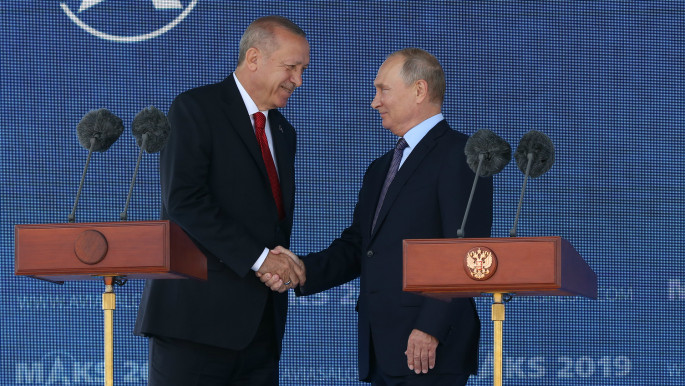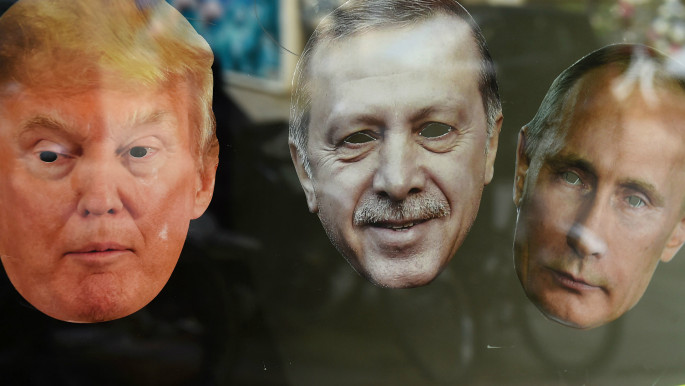Turkey expands its military base and influence in Qatar
The first soldiers of the Turkish Armed Forces (TSK) arrived in Qatar in late 2015 under the deal inked in December 2014 between Turkish and Qatari authorities.
Turkish soldiers were deployed to the military Tarik Ibn Zeyad base, named after the Berber general who led the Muslim conquest of Spain in the 8th century.
So far, the Turkish presence involves a mechanised battalion with an estimated strength of 300 men, but according to Turkish reports, the Turkish contingent will grow into a brigade of around 2,000 soldiers. According to the German media outlet Der Spiegel, the number of Turkish soldiers in Qatar may soon exceed 5,000.
Friends in need
Cooperation between Turkish and Qatari militaries has notably intensified since the Saudi-led blockade on Qatar in June 2017. Many Qataris believe Saudi Arabia, the UAE and Bahrain's siege to be a coup attempt against Qatar's sovereignty.
Turkey was the first state to support Qatar and openly sided with Doha in one of the most challenging moments of the small Gulf state's history.
 |
|
| Read also: This is why Turkey will not buy the Russian fighter jets |
Immediately after the imposition of the blockade, Turkey dispatched airlift and naval expeditions and supplied Doha with approximately 4,000 tons of food supplies. In addition to this, the size of the Turkish military contingent in the Gulf country was increased.
Since then, the cooperation between the Turkish and Qatari militaries has notably intensified through a number of high-level visits, joint training and war games.
At the initial stage, opening a Turkish military base in a Gulf country was serving Turkey's increasing influence in the region and a counter-balancing step concerning Iran and Saudi Arabia.
According to the head of the Qatar-Turkey Combined Joint Force Command (QTCJFC), Colonel Osman İlercil, the presence of Turkish military in the tiny emirate is aimed at boosting their defence capabilities as well as sharing knowledge, experience and Turkish culture.
While the increased presence of the Turkish contingent in the Gulf has been warmly welcomed by Qataris and their leadership, the Turkish military build-up in the region has raised considerable suspicions among Qatar's neighbours, notably the Saudis.
Consequently, in the infamous 13 points ultimatum given to Qatar, one of the demands made by the blockading Quartet states was for Qatar to end its military cooperation with Turkey and remove all Turkish troops. Instead, Turkey has increased the number of soldiers and sent even more armoured vehicles to Qatar.
 |
Consequently, in the infamous 13 points ultimatum given to Qatar, one of the demands made by the blockading Quartet states was for Qatar to end its military cooperation with Turkey and remove all Turkish troops. Instead, Turkey has increased the number of soldiers and sent even more armoured vehicles to Qatar |  |
According to Birol Baskan, a non-resident scholar at the Middle East Institute, "It seems that Turkey's move is more like a gesture to Qatar, with whom Turkey has developed quite a special relationship with in the aftermath of the military coup in Egypt when both countries were isolated in the region."
For Professor Selcuk Colakoglu, director of the Ankara-based Turkish Centre for Asia Pacific Studies, as the ruling AKP has clearly sided with Doha, the Qatar crisis has turned into a proxy between Ankara and Riyadh.
He explained that for Turkey's long-term interest and economic sustainability, a 300-soldier-base is good enough for Ankara. "The decision to enlarge the Turkish military presence up to 2,000 soldiers seems as though Turkey and Qatar are taking up measures for an imminent military invasion threat from Saudi Arabia."
But for Qatari foes, Turkey's move is being seen as Qatar "wanting to provoke its Arab neighbours", whose relations with Turkey reached historical lows. According to Baskan, these relations "will not get better any time soon."
Besides Qatar's rift, relations between Saudi Arabia and Turkey have been increasingly strained by diplomatic differences and by each other's involvement in the Syrian civil war, and in Egypt where the Saudis and the UAE were extremely disappointment by AKP's support for the Muslim Brotherhood and for deposed president Mohammed Morsi, considered by them as a terrorist group on par with al-Qaeda and the Islamic State group.
Defence industry bonds
Apart from close political and personal ties between Qatari and Turkish leadership, the defence industry has been one of the key areas for the expanding cooperation, with Turkey growing into a major supplier of military equipment for Qatar.
Speaking to The New Arab, Colakoglu listed all the major military deals between Turkish arm producers and Qatar. These include: Baykar, which produces the TB-2 armed drones; Nurol Makina, the manufacturer of the 4x4 Ejder combat vehicles; BMC, which produces the Kirpi mine-resistant, ambush-protected vehicles and Amazon multipurpose armoured vehicles; and the Anadolu Shipyard, which manufactures cadet training ships. Important contracts for these were achieved at the 2018 International Maritime Defence Exhibition and Conference in Doha, with the two countries signing deals worth a total of $800 million.
Moreover, Jane's Defense Industry reported last October that Turkey's Aselsan company had formally incorporated a joint venture (JV) with Qatar's Barzan Holdings. The main focus here would be the production of command-and-control (C2) systems, thermal and night-vision cameras, cryptographic systems, and remote-controlled weapon stations (RCWS).
 |
|
| Read also: How will the S-400 vs F-35 saga between Turkey and the USA end? |
Colacoglu also noted that Turkey's Defence Industry Presidency and the joint Turkish-Qatari vehicle manufacturer BMC had signed a multibillion-dollar contract for the serial production of the Altay battle tank in 2018; 250 tanks are to be produced for Turkey and 40 for Qatar.
These developments indicate that Qatar has not only become a market for the Turkish defence industry but also an investor for it, Colacoglu adds.
However, according to media outlets in the Gulf, "since a large number of countries have stopped their military imports from Turkey, Turkish defence companies are trying to compensate for their losses by doing business with Qatar."
This may be true to some point with the increased possibility of US sanctions against Turkey, after the S-400 missile defence system deal with Russia this summer.
Consequently, the US administration expelled Turkey and their companies from the joint F-35 jet fighter programme, in which Turkish companies had contributed to the production of over 900 parts for this newest jet.
Art of tightrope walking
Since the start of the siege, Qatar has consolidated and improved its relations with all key players in the region, even those powers tearing at each others' throats.
By cleverly balancing between the US, Turkey and Iran, Qatar has once again proved it's remarkable diplomatic skills, although it is questionable for how long the tiny emirate will be able to manage to balance these delicate relations since tensions among them are on the rise.
On the other hand, the increased presence of Turkish troops in the region will definitely increase the tension between the Ankara, Riyadh and Abu Dhabi alliance in the Gulf, but according to both Colakoglu and Baskan, at this stage, the Turkish military presence does not pose a threat to the United States which has about 14,000 soldiers at the Al Udeid Air Base in Qatar.
Furthermore, Al-Udeid is the only regional runway capable of servicing huge B-52 bombers, which makes Qatar an even more precious ally for Washington. In return, the US has adopted a more neutral position in the Gulf crisis after initially expressing support to Saudi-UAE side.
However, Turkey-US relations are far more complicated. But despite growing tensions, Colacoglu says that Ankara and Washington have tried to narrow the gap in several issues such as the defence industry and in Syria. He believes that the US also needs Turkey for its new Iranian sanctions towards its nuclear programme.
Without Turkey's participation in the sanctions, the Trump Administration may not be able to get its desired political outcome against the Iranian regime.
Stasa Salacanin is a freelance journalist who has written extensively on Middle Eastern affairs, trade and political relations, Syria and Yemen, terrorism and defence.





 Follow the Middle East's top stories in English at The New Arab on Google News
Follow the Middle East's top stories in English at The New Arab on Google News


